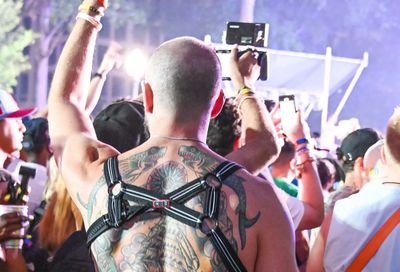‘Former homosexual’ loses lawsuit after Vimeo deleted conversion therapy videos
James Domen said Vimeo discriminated against him when it deleted his conversion therapy videos. A federal court disagreed.

An ex-gay pastor who advocates for conversion therapy has lost his lawsuit against online video platform Vimeo.
James Domen, of ex-gay ministry Church United in California, sued Vimeo after his account was deleted in 2018 for promoting “sexual orientation change efforts” in five videos.
Posting content advocating for conversion therapy — a widely debunked practice that purports to forcibly change a person’s sexual orientation or gender identity — contravenes Vimeo’s terms of service.
Domen sued Vimeo, alleging that the company was acting in bad faith by discriminating against him for his sexual orientation — which he describes as “former homosexual” — and his religious beliefs.
Robert Tyler, Domen’s attorney, said in court that Vimeo deleting Domen’s account was “like telling Rosa Parks to find another bus,” Courthouse News reports.
In his lawsuit, Domen stated that “because of his desire to pursue his faith in Christianity, he began to identify as a former homosexual.”
“Through Church United, he shares his experience with other pastors and helps pastors counsel others that are on their own journey toward a heterosexual identity through a biblical perspective and a Christian worldview,” the complaint read.
Domen alleged that Vimeo “deleted Church United’s account based on Vimeo’s subjective perception of Christianity and sexual orientation.”
Unfortunately, that argument didn’t pass muster with the U.S. District Court for the Southern District of New York.
U.S. Magistrate Judge Stewart Aaron dismissed Domen’s lawsuit, ruling that the Communications Decency Act grants Vimeo the right to remove content it perceives to be “obscene, lewd, lascivious, filthy, excessively violent, harassing, or otherwise objectionable.”
“In this case, Vimeo plainly was acting as a ‘publisher’ when it deleted (or, in other words, withdrew) plaintiffs’ content on the Vimeo website,” Aaron wrote.
He noted that Vimeo’s emails to Domen “reflect that Vimeo removed plaintiffs’ account because of the content of plaintiffs’ videos, not based upon Domen’s sexuality or religion.”
Tyler told Courthouse News that the court’s decision was “very concerning,” arguing that it gives social media platforms immunity from liability “when they engage in intentional acts of discrimination toward protected classes.”
While Domen may argue that he has renounced his homosexuality, a number of conversion therapy — or ex-gay — advocates have recently come out as gay and called for bans on the harmful practice, saying it does not work.
Last year the American Medical Association announced that it will push for a nationwide ban on conversion therapy, arguing that it has zero scientific basis and saying it “opens the door to fraud, harm and trauma for many adults and children in the U.S.”
Conversion therapy can include a number of different “therapies,” including talk therapy, behavior-modification therapy, or forms of aversion therapy — including electroshock, chemical, and deprivation therapy.
In September, a study was published showing that transgender people who are subjected to conversion therapy are at a higher risk of experiencing psychological distress than their transgender peers.
Also that month, one of America’s biggest conversion therapy advocates came out as gay and admitted that the practice is not only a “lie,” but also “very harmful.”
McKrae Game, the founder of Hope for Wholeness, a South Carolina faith-based conversion therapy organization that purports to change a person’s sexuality, said it was “false advertising” to claim that conversion therapy could change an LGBTQ person’s sexuality or gender identity.
In February, David Matheson, a former “ex-gay” advocate who spent years promoting conversion therapy to LGBTQ Mormons, finally admitted that the practice does not work and should be stopped.
In an interview with Britain’s Channel 4 News, Matheson said that conversion therapy “just can’t” change a person’s sexual orientation, that it “should be stopped” in the U.S., and expressed regret over the harm caused to LGBTQ people by his work.
In January, John Smid — former executive director of Love in Action, a conversion therapy organization — stated that the practice does not work and should be stopped.
Smid, who inspired a character in conversion therapy drama Boy Erased, wrote in a column for the Advocate that organizations still advocating for the practice in 2019 “blithely disregard the mountain of evidence” against it.
And in 2013, Alan Chambers, president of conversion therapy umbrella organization Exodus International, came out as gay and shuttered Exodus for good.
Speaking to Metro Weekly in 2016, he said that people should be warned against conversion therapy: “This is not something that’s going to work. This is dangerous. It creates shame. It is not something that is going to produce an orientation change in you.”
Chambers said that conversion therapy should be banned for adults, not just minors, and unlike Matheson, both he and Smid are working to make amends for the damage inflicted by their work.
Related:
Trump adviser said lesbian teen “seriously” considering suicide should undergo conversion therapy
Trump adviser Jenna Ellis endorsed conversion therapy and called HIV “God’s moral law”
Utah pushes rule banning conversion therapy, will go into effect Jan. 22
Read more:
Arizona Republican pulls her sex ed bill after criticism that it’s “anti-gay”
Kentucky Christian school expelled girl for rainbow sweater and cake
Baltimore is city with highest STD rates, D.C. ranks in top 20
Support Metro Weekly’s Journalism
These are challenging times for news organizations. And yet it’s crucial we stay active and provide vital resources and information to both our local readers and the world. So won’t you please take a moment and consider supporting Metro Weekly with a membership? For as little as $5 a month, you can help ensure Metro Weekly magazine and MetroWeekly.com remain free, viable resources as we provide the best, most diverse, culturally-resonant LGBTQ coverage in both the D.C. region and around the world. Memberships come with exclusive perks and discounts, your own personal digital delivery of each week’s magazine (and an archive), access to our Member's Lounge when it launches this fall, and exclusive members-only items like Metro Weekly Membership Mugs and Tote Bags! Check out all our membership levels here and please join us today!





























You must be logged in to post a comment.